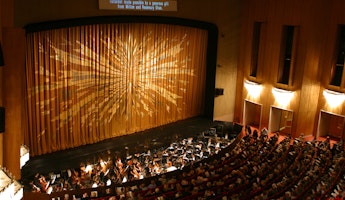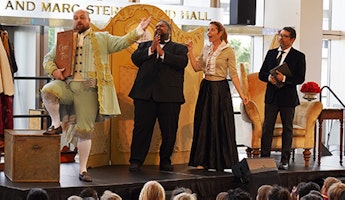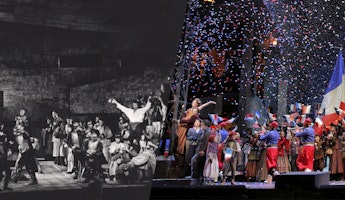Blog
November 21, 2022
Michael Fabiano: A Revolutionary On and Off the Stage
What have you looked forward to most about performing Tosca here at LA Opera?
Well, for me being in LA is familial to me, Los Angeles means I get to be close to family, friends, and people that I love. Secondly, it's nice to be in great weather; I know these sound like very benign answers, but they're relevant for singers like myself that travel around the world all the time. It's a nice reset to be in a place where the weather's nice, things are low key, and a calm nice and respectful work environment.
How would you describe your character?
I'm singing the role of Cavaradossi who is, let's call him, a freedom fighter. A freedom fighter who disguises himself as an artist. He's a revolutionary, he believes in the cause of nation, he believes in the cause of freedom, and he is fighting statism and authoritarianism. I think there's something very relevant in our times these days about people being revolutionaries fighting the fascist state.
Do you think you relate to your character in any way?
Oh, yes. I'm very anti-fascist, anti-authoritarianism, anti-state.
You’ve sung the role many times. Why do you keep coming back to Cavaradossi?
It's a kind of jewel of a role for the tenor. I have to say, just as a sung piece of music, it is incredibly well constructed. It's a beautiful build from beginning to end; it's not heavy handed at the beginning, and then low impact at the end, like Pinkerton in Madame Butterfly, for instance, where the tenor does a lot in the first 30 minutes, and then musically sits around and does nothing until the very bitter end of the opera. This one is a very methodical build. It's a vocal challenge, but also a vocal delight at the same time. I also come back to it because I believe in this character, and I believe in what his mission is and what he's fighting for. As much as he has fought very hard for freedom and liberty, at the end of the day, it's clear that he has a heart and a deep passion for those that he loves, and I relate deeply to that type of person.
So, on a performance day, what does your day typically look like? Do you have any pre-performance rituals?
On the day of a performance, I do my best to sleep up to 10 hours before the show. I wake up very late the day of a show, I do not set an alarm when theaters ask me to check in early at 11 in the morning or sometime, I tell them, “Too bad, you're gonna have to wait till I wake up” because that's my system. I like the peak of my day to be when I get on the stage. I don't want to wake up at 10 in the morning and then have a big energy dip by 7pm. The only other thing I would say that's ritual for me is, I tend to try to walk 10,000 or 12,000 steps, get a lot of steps in, kind of stretch, move my shoulders, do some light Pilates, and I have a very basic meal that I never changes: chicken, yams or sweet potatoes, and broccoli on the day of my show. Very simple.
You just performed Tosca about two weeks ago at the Met and it happened to be their 1,000th performance of that opera. How was that experience?
Wonderful. I mean, it's incredible to know that an opera theater like the Metropolitan Opera has presented 1,000 performances of Tosca that happened to have been the last performance I did there. I also appeared in the 1,000th performance of La Traviata at the Met.
What guided you to opera? How did you know this is what you were made to be doing?
My first teacher, [the great American tenor] George Shirley, when I was studying with him, said something very compelling, which was: when someone is endowed with an incredible talent, they have a moral responsibility to share their talent with the rest of the world. And I think that's a very strong message to live by.
When you’re not onstage blessing hundreds with that voice, you're often piloting airplanes. How did you get into that?
Oh, man. I've always loved airplanes since I was a young person, but I admit, I can't explain it. The notion of being free and focusing on just the sky and being completely committed to flying has really informed my singing; that when I'm performing it is freedom in singing and nothing else, not doing anything else whatsoever.
Tell us about the nonprofit you co-founded, ArtSmart.
We created Art Smart to, first, very generously compensate younger working musicians. We wanted to help artists have access and find more work to find dignity in their studies and hard work as artists. We realize that we can help kids on their learning curve in academia through music instruction and the way to do it the best is to pair [younger working musicians] with children in under-resourced communities that didn't have any music lessons to help them have a chance at not just learning how to be musicians, but learning basic life skills, how to communicate better. Now, ArtSmart is a nationwide organization in nine American cities, we're very proud of what we've done. We've delivered over 30,000 music lessons, dispersed over two million in income working artists, and we've taught thousands of children many of which we are now helping get into college and get full rides to different universities around the United States.








/03-cosi/_dsc0996_pr.jpg?format=auto&fit=crop&w=345&h=200&auto=format)















